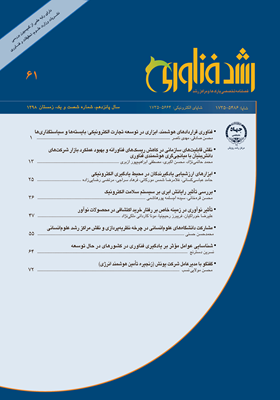شناسايي عوامل مؤثر بر يادگيري فناوري در كشورهاي در حال توسعه
محورهای موضوعی : زيرساختهاي توسعه فناوري و نهادهاي پشتيبان توسعه فناوري
1 - پژوهشگاه ارتباطات و فناوري اطلاعات
کلید واژه: يادگيري فناوري راهبرد همپايي ظرفيت جذب قابليتهاي فناورانه كشورهاي در حال توسعه,
چکیده مقاله :
يادگيري فناورانه بهعنوان روشي درونزا براي ايجاد قابليتهاي فناورانه در كشورهاي در حال توسعه تعريف ميشود كه بيانگر توانايي يك سازمان براي استفاده مؤثر از فناوري، جذب و سازگاري فناوريهاي بیرونی و ايجاد فناوريهاي جديد در طول زمان همراه پاسخ به تغييرات محيطي است. سه ويژگي مهم يادگيري فناوري شامل تغيير فناورانه تدريجي، انتشار بينالمللي فناوري و تلاشهاي فناورانه بومي ميباشد. در این پژوهش عوامل مؤثر بر یادگیری فناوري شناسايي شدهاند. براي استخراج این عوامل از روش فراتركيب یا متاسنتز استفاده شده است که در آن یافتههای حاصل از سایر مطالعات کیفی تفسیر و با هم ترکیب میشوند تا به سطح مفهومی جدیدی در پاسخ به سؤال پژوهش دست یابیم. اين روش در چهار گام اصلي جمعآوري و بررسي يافتهها؛ شناسايي ارتباطات ميان بررسيهاي انجامشده و خلاصهسازي نتايج؛ تفسير و ترجمه؛ و ارائه نتايج تلفيقهاي بهعمل آمده به كار گرفته شده است. بدین ترتیب با مطالعات انجامشده، دو مؤلفه اصلی مشتمل بر قابليتهاي فناورانه (ظرفيت جذب) و راهبرد همپایی بهعنوان مؤلفههای کلیدی معرفي شدهاند. سپس با تحلیل مؤلفهها، اجزای اصلی هریک شناسایی و مدلسازي شدهاند. قابلیتها با مجموعهای از عوامل شناسایی شدهاند که تحت عنوان عوامل بنگاهی (شامل دانش داخلی کارکنان، راهبردهای سازمانی و سطح قابلیتهای فناورانه)، عوامل ملی (شامل شرایط بازار و فضای رقابتی، فرهنگ و آموزش عمومی، سیاستها و قوانین و زیرساخت فنی) و عوامل جهانی (شامل سیالبودن، تعدد نوآوریها و پیچیدگی فناوریها) دستهبندی شدهاند. سطح قابلیتهای مذکور تعیینکننده راهبرد همپایی خواهد بود. شناخت این عوامل کمک میکند که با تمرکز بر آنها، سرعت و قدرت یادگیری فناوري در بنگاهها و صنايع كشورهاي در حال توسعه به نحو مطلوبی تحت تأثیر قرار گيرد. توجه به ایجاد قابلیتهای فناورانه و ظرفیت جذب در سطح بنگاههای داخلی با هدف ارتقای بومیسازی فناوری، انتخاب روش مناسب برای کسب فناوری در راستای تشویق یادگیری و کسب مهارتهای جدید، و همچنين توجه به توسعه قابلیتهای مکمل منجر به توسعه يادگيري فناوري و موفقيت طرحهاي فناورانه در كشور خواهد شد.
Technological learning is defined as an endogenous way of generating technological capabilities in developing countries, reflecting the ability of an organization to effectively use, absorb and adapt external technologies, and develop new technologies over time, responding to environmental changes. Three important features of technological learning include gradual technological change, international diffusion of technology and local technological endeavors. In this research, the factors influencing technological learning have been identified. According to studies, two main components, including technological capability (absorption capacity) and catch up strategy have been introduced as key components. Then, by analyzing the components, the main factors of each have been identified and modeled. Capabilities have been identified with a set of factors that are categorized as enterprise factors (including internal knowledge of employees, organizational strategies, and technological capabilities), national factors (including market conditions and competitive environment, culture and education, policies and regulations, and Technical infrastructure) and global factors (including fluidity, multiplicity of innovations, and complexity of technologies). The level of these capabilities will determine the catch up strategy. Understanding these factors helps to influence the speed and power of technological learning in firms and industries in developing countries. Considering the development of technological capabilities and absorption capacity at the level of enterprises with the aim of promoting the localization of technology, choosing the appropriate method for acquiring technology in order to encourage learning and acquiring new skills, as well as paying attention to the development of complementary capabilities will lead to the development of technological learning and the success of the technological plans in the country.
